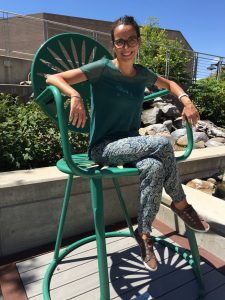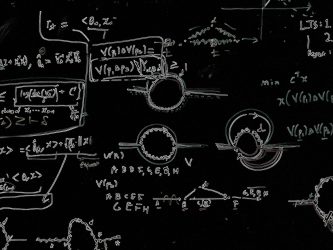Carla Michini is a postdoc in the Optimization group. Her intriguing white board diagrams of cyclic reduction (above) offer only a tiny glimpse of her breadth of knowledge. Her talk “Beyond Combinatorial Optimization: Polyhedral Methods for Game Theory” is on March 27th.

What do you work on?
I am mainly interested in combinatorial optimization. In combinatorial optimization, the goal is to find the best object in a finite, but typically huge, collection of objects. Think of the shortest path problem: in a real-world instance the number of routes from a given start point to the destination is so large that it is impossible to scan all the possibilities one by one. This is why optimization is the way to go!
There are a lot of applications of combinatorial optimization to production and transportation planning, routing, scheduling and timetabling, computational biology, and network economics. I am currently interested in applications to power systems, game theory, network design, and programming languages.
What are your tools for analysis?
Structure is the key! In a combinatorial optimization problem there is often a hidden structure to discover and exploit, leading to efficient algorithms and solution methods. My approach is to understand what structures affect the computational complexity of a problem. In fact, some problems can be difficult to solve in general, but they can become tractable if certain structural properties hold. This is often the case in real-world problems.
What are your tools for writing?
Concretely, my main tool for writing is LaTeX, both for for manuscripts and presentations. But before I start to type there is a lot of thinking going on…When I write or prepare for a talk my goal is to convey even difficult concepts in the simplest possible way. It is important for me to always keep in mind what are the main results and ideas that I absolutely want people to grasp and remember. This is why I often state the main results and key ideas in the very beginning of my presentation/paper, and I get more technical only later on.
What are your tools for collaboration?
I mainly use emails to keep in touch with colleagues from other universities, and Skype to have long-distance meetings. I use Dropbox to share files, as well as Git. Conferences and workshops are great for networking. I particularly like small ones, that are more focused and where I get to interact more intensely with a smaller group of people.
What is your ultimate tool for discovery?
Abstraction is crucial. It often helps to simplify a problem as much as possible, and to understand what makes it non-trivial. It is also important to make connections with other problems, to understand common structures and use related approaches, but also to identify what are the specific features that are critical in our problem and need to be addressed with completely new techniques.
Finally, I think the main tool for discovery is to ask the right question. Sometimes it is harder than to find the right answer!
-curated by Patricia Pointer


You must be logged in to post a comment.